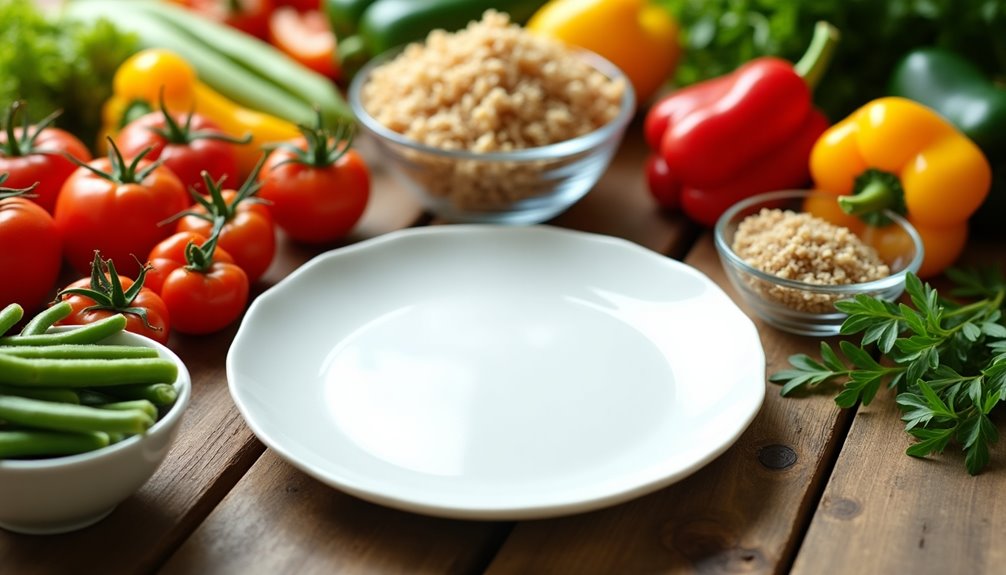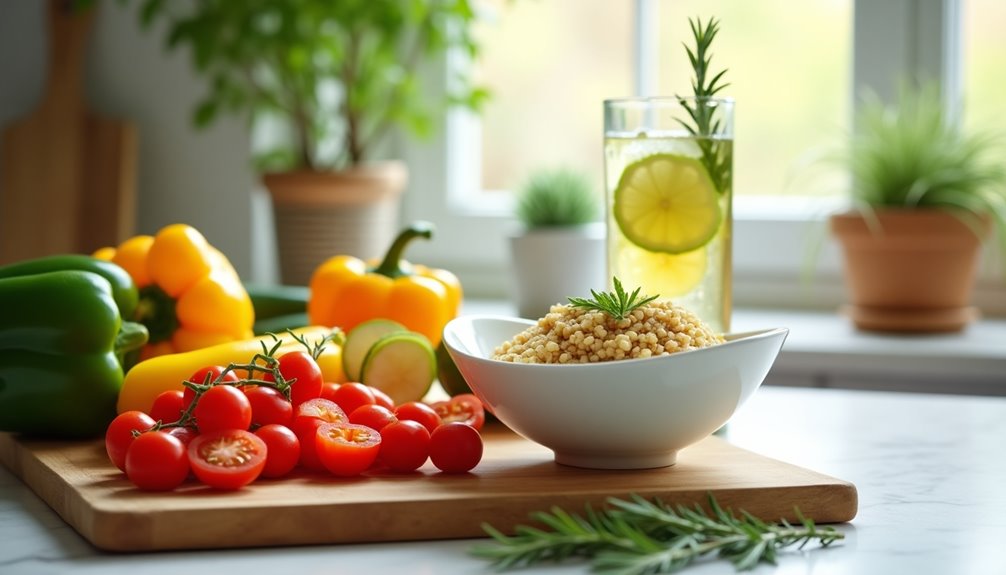A renal diet is essential for maintaining kidney health and requires you to monitor your intake of certain nutrients. You'll need to limit sodium to reduce kidney strain, control protein consumption, and manage potassium and phosphorus levels. Incorporate lean proteins like chicken and fish, and enjoy a variety of fruits and vegetables for necessary nutrients. Staying hydrated is crucial, too. Opt for homemade meals to better control ingredients, and consider using herbs instead of salt for flavor. By making these dietary changes, you can greatly support your kidney function and overall well-being, and there's more helpful information ahead.
Key Takeaways
- Limit sodium intake to reduce kidney strain and maintain fluid balance.
- Choose lean protein sources like chicken and fish to support kidney function.
- Monitor potassium and phosphorus levels by avoiding high-rich foods such as bananas and dairy.
- Stay hydrated by drinking adequate water throughout the day for optimal kidney health.
- Plan balanced meals with a variety of nutrients and practice portion control for effective renal management.
Understanding Kidney Function

Understanding kidney function is important for managing your health, especially if you have kidney disease or are at risk. Your kidneys play a critical role in maintaining your overall well-being by filtering blood and removing waste. This process, known as kidney filtration, helps regulate fluid balance, electrolyte levels, and blood pressure, ensuring your body functions efficiently.
When your kidneys filter blood, they eliminate toxins and excess substances, which are then excreted as urine. The efficient waste removal provided by your kidneys is essential; any disruption can lead to the accumulation of harmful substances in your body.
If you're living with kidney disease, understanding how your kidneys work can empower you to make informed decisions about your health.
When kidney function declines, waste products can build up, leading to various health issues. You might experience symptoms like fatigue, swelling, or changes in urination. Recognizing these signs early can help you seek medical advice and take action to manage your condition effectively. Additionally, following a custom keto diet can help support kidney health and overall well-being.
Key Nutrients to Manage

Managing kidney health involves paying attention to the nutrients you consume, as they can directly impact your kidney function. One of the key nutrients to focus on is protein. While protein is essential for your body's overall health, too much can strain your kidneys. It's important to work with your healthcare provider to determine the right amount of protein for you, balancing your needs with your kidney function. Lean sources, such as chicken, fish, and plant-based proteins, can be good options if managed properly.
Another vital aspect to concentrate on is fluid balance. Your kidneys play an essential role in regulating fluid levels in your body. Depending on your individual condition, you may need to monitor your fluid intake to prevent overload, which can lead to complications. Keeping track of how much you drink, along with any foods that contain fluids, can help you maintain a healthy balance.
Both protein intake and fluid balance are key components of a renal diet. By understanding and managing these nutrients, you're taking proactive steps toward supporting your kidney health. Additionally, addressing underlying health conditions can significantly improve CKD symptoms and overall kidney function. You don't have to navigate this journey alone; connecting with a healthcare team can provide valuable guidance tailored to your unique needs. Remember, every small adjustment you make in your diet can lead to significant improvements in your overall well-being. Your health matters, and you deserve to feel your best.
Foods to Limit or Avoid

When it comes to a renal diet, there are several foods you'll want to limit or avoid to protect your kidney health. First and foremost, you'll need to pay attention to sodium restrictions. High sodium intake can lead to increased blood pressure and fluid retention, which puts extra strain on your kidneys. Processed foods, canned soups, and salty snacks should be minimized. Instead, opt for fresh ingredients and flavor your meals with herbs and spices rather than salt.
Next, you'll want to be mindful of your protein intake. While protein is essential for overall health, excessive amounts can create waste that your kidneys must filter. This is particularly important if you have chronic kidney disease. Focus on lean sources of protein, such as poultry, fish, and plant-based options, but keep your portions in check. Consult with your healthcare provider or a dietitian to determine the right amount for you.
Additionally, limit high-phosphorus foods like certain dairy products, nuts, and processed meats, which can also pose problems for kidney function.
Sugary drinks and high-potassium foods, such as bananas and potatoes, may need to be restricted depending on your specific condition. Moreover, managing your blood pressure is crucial as high blood pressure can significantly impact kidney health.
Recommended Kidney-Friendly Foods

A healthy renal diet includes a variety of kidney-friendly foods that can support your overall well-being. Choosing the right foods not only helps maintain your kidney health but also enhances your daily quality of life.
When it comes to protein sources, focus on lean options like chicken, turkey, and fish. These provide essential nutrients without overloading your kidneys. Plant-based proteins, such as lentils and beans, can also be beneficial, but be mindful of portion sizes to keep phosphorus and potassium levels in check.
Incorporating fruits and vegetables into your meals is crucial. Apples, berries, and cauliflower are excellent choices that provide vitamins and fiber while being low in potassium. Whole grains, like white rice and bread, offer energy without stressing your kidneys.
Don't forget about healthy fats! Olive oil and avocados can help maintain your heart health, which is essential for overall kidney function. Additionally, a plant-based diet can offer significant health benefits that may further support kidney health.
Lastly, managing your hydration levels is vital. Drinking enough water helps your kidneys filter waste effectively. However, it's important to consult your healthcare provider about the right amount for you, especially if you need to monitor your fluid intake.
Meal Planning Tips

Effective meal planning is crucial for maintaining a kidney-friendly diet and can make a significant difference in your overall health. By organizing your meals and making mindful choices, you'll not only save time but also make sure you're eating foods that support your kidney health. Start by creating a weekly meal plan and stick to it during grocery shopping. This can help you avoid impulse purchases and keep your diet balanced.
Consider portion control as well. Eating the right amount of food is key to managing kidney health and preventing overeating. Here's a simple table to help you visualize your meal planning:
| Meal | Food Choices | Portion Size |
|---|---|---|
| Breakfast | Oatmeal with berries | 1 cup |
| Lunch | Grilled chicken salad | 3 oz chicken, 2 cups mixed greens |
| Dinner | Steamed vegetables and quinoa | 1 cup veggies, ½ cup quinoa |
| Snack | Apple slices with almond butter | 1 medium apple, 2 tbsp almond butter |
| Dessert | Greek yogurt with honey | ½ cup yogurt, 1 tsp honey |
Using this table, you can easily adjust meals according to your preferences and nutritional needs. Don't forget to prepare some meals in advance to make it even easier during busy days. Additionally, plant-based diets can provide essential nutrients that support kidney health, making them a valuable consideration in your meal planning. Connecting with others who are also focusing on a renal diet can provide additional support and ideas, making your journey towards better kidney health feel more communal and fulfilling.
Lifestyle Changes for Kidney Health

Making lifestyle changes is necessary for promoting kidney health and preventing further complications. You can take proactive steps by focusing on two key areas: establishing an exercise regimen and prioritizing stress management.
Regular physical activity is essential for maintaining overall health and can greatly benefit your kidneys. Aim for at least 150 minutes of moderate exercise each week. This can include brisk walking, swimming, or cycling—whatever you enjoy most. Finding a workout buddy can also help you stay motivated and make exercise more enjoyable.
On the other hand, managing stress is equally important. Chronic stress can negatively affect your kidney function, so it's important to incorporate stress-reducing practices into your daily routine. Techniques such as mindfulness, yoga, or deep breathing exercises can help you feel more grounded and in control. Consider setting aside time each day for activities that bring you joy, whether that's reading, gardening, or spending time with loved ones. Additionally, practicing mindfulness meditation can enhance your ability to cope with stress and support your overall well-being.
Monitoring Your Progress
Here are some effective ways to monitor your progress:
- Keep a food diary: Write down everything you eat and drink to identify patterns and areas for improvement.
- Track your blood pressure: High blood pressure can strain your kidneys, so regularly checking this essential sign helps you stay informed.
- Schedule lab tests: Regular blood and urine tests can provide insights into your kidney function and overall health.
- Maintain a weight log: Tracking your weight can help you recognize any significant changes that may affect your kidney health.
By consistently reviewing these aspects, you'll get a clearer picture of how well you're doing. It's important to remember that progress isn't always linear; sometimes you may experience setbacks. That's okay! What matters is your commitment to your health. Incorporating practices from research-based approaches can also enhance your journey.
Engaging with healthcare professionals can also enhance your journey. They can provide personalized feedback and adjustments to your plan. Remember, you're not alone in this process; many are on a similar journey toward kidney health. So, embrace the journey of monitoring your progress—you're taking crucial steps toward a healthier future!
Frequently Asked Questions
Can I Consume Alcohol on a Renal Diet?
You might wonder about alcohol consumption and its effects on kidney function. While moderate drinking can be acceptable for some, it's important to think about how it impacts your overall kidney health. Alcohol can add pressure to your kidneys, especially if you have underlying conditions. It's vital to handle that pressure effectively.
Always talk about your consumption habits with your healthcare provider to make sure you're making the best choices for your health and well-being.
How Does Stress Affect Kidney Health?
Stress can greatly impact your kidney health. When you experience chronic stress, it can lead to increased blood pressure and inflammation, both of which can harm your kidneys. To support your kidneys, focus on stress management techniques like mindfulness, exercise, and adequate sleep.
Making lifestyle changes, such as eating well and staying hydrated, can also help reduce stress levels. Remember, taking care of your mental health is just as important as your physical health.
Are There Specific Spices Safe for Kidney Health?
When it comes to spices, you'll find several that are safe and can enhance your meals. Consider using garlic, turmeric, and cinnamon. These spices not only boost flavor but also offer potential health benefits.
You can experiment with flavor combinations, like pairing garlic with lemon or turmeric with black pepper, to create delicious dishes.
Always consult with your healthcare provider to confirm these spices fit your specific needs while enjoying a variety of tastes.
Can Kidney Disease Affect My Weight?
Can't you just feel how your weight can fluctuate? Kidney disease can definitely affect your weight management. Many patients experience weight loss due to dietary restrictions or a reduced appetite.
On the other hand, some may gain weight from fluid retention. It's important to monitor your weight regularly and discuss any changes with your healthcare provider, as they can guide you toward maintaining a healthy balance while managing these challenges.
What Are the Signs of Kidney Disease Progression?
As kidney disease progresses, you might notice signs like fatigue, swelling, or changes in urination.
You may face dietary restrictions and need to make lifestyle changes to manage your health.
It's crucial to stay aware of these symptoms, as early intervention can help slow progression.
Don't hesitate to reach out to your healthcare team for support—they're there to help you navigate this journey and make adjustments that fit your needs.
Conclusion
In the quest for kidney health, you might find it ironic that the foods you once loved can become your greatest foes. By embracing a renal diet, you're not just avoiding pitfalls but actively choosing a path to wellness. Remember, each meal is an opportunity to nourish your kidneys and your overall health. As you monitor your progress, you'll realize that these mindful decisions, while initially limiting, can lead to a more vibrant, fulfilling life.



